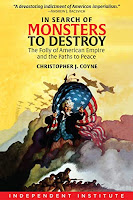“Politics of Being” is title of a recently published book by
Thomas Legrand. The subtitle is “Wisdom and science for a new development
paradigm”. The question I ask myself is whether Legrand’s views support
progress as I defined the concept in Freedom,
Progress, and Human Flourishing. Would widespread adoption of
Legrand’s views enhance the growth of opportunities for individuals to obtain
the basic goods of flourishing humans?
Before I purchased the book, I was aware that the author had
shown wisdom by including this quote from Elinor Ostrom’s Nobel Lecture:
“A core goal of public policy should be to facilitate the
development of institutions that bring out the best in humans.”
That passage is actually quoted several times in the book and
is sometimes accompanied by the preceding sentence in which Ostrom distances
her approach from that of policy analysts who design institutions “to force (or
nudge) entirely self-interested individuals to achieve better outcomes”. The
passage I have quoted at the top of this article illustrates Ostrom’s
optimistic view of the capacity of individuals to work together to devise
solutions to collective action problems without help from governments.
The essence of Legrand’s line of argument is that the world
is stuck in an obsolete development path and is in need of a new “wisdom-based
approach to politics”. I will discuss
briefly what he perceives to be wrong with the current development path, before
discussing some elements of the alternative path he advocates.
Perception of the problem
Legrand believes that the current development path is
causing many problems. The world is on track for a climate change catastrophe.
Economic development and increased life expectancy are not making people much
happier in high-income countries. Many countries seem to be facing mental
health crises. There has been a decline in interpersonal trust in many countries.
Our current model of development is rooted in a set of values that are causing
a civilization crisis. He writes:
“Our economic system not only destroys social ties and the
environment but feeds on these destructions that create new market
opportunities. It seeks to adapt humans to its own requirements rather than
adapting itself to human needs. Based on fundamental misconceptions, this
system can only perpetuate itself through ever more propaganda that feeds our
disconnection from ourselves, our true needs, and ultimately, our apathy.”
I agree that all is not well with the world and share some
of Legrand’s concerns. However, I am more optimistic than he is about climate
change, and strongly disagree with his views on economics. Readers who are
interested in my views should read Freedom,
Progress, and Human Flourishing.
Being and Interbeing
Legrand argues that the new development model required is
essentially spiritual. He views spiritual development as:
“the process by which we come closer to our true nature.
From that connection, we naturally tend to manifest the highest qualities:
wisdom, love, joy, peace etc., or simply the best or most authentic version of
ourselves currently available!”
Legrand’s discussion of spiritual values includes chapters
on life, happiness, love, peace, mindfulness, and light.
According to Legrand the new paradigm involves a transition from
“having to being, which many believe means interbeing”. So, what is interbeing?
“Interbeing is a term
coined by Zen Master Thich Nhat Hanh, which goes beyond interconnectedness to
touch on the very nature of our being. It expresses the nature of reality based
on the Buddhist teachings of interdependent co-arising (“that is because this
is”), non-self, and impermanence”.
I see no problem accepting that everything is
interdependent. Impermanence does seem pervasive (except in respect of
fundamental values, virtues, and the highest qualities). But “non-self” poses
problems. As I see it, self-awareness is a fundamental characteristic of the
kind of thing (entity or system) that an individual human is. Self-respect arises from self-awareness, and motivates
respect for other people, and other living things. Respect is the foundation
which makes love possible. By the way, do you know who it was who said “one
should not hurt others if one loves oneself”? The answer is here.
At various points in the book Legrand recognizes that people
have “higher selves” and “true selves”, so he seems to acknowledge that we
should aim to purify our egos – to remove the biases, distortions, and
attachments that tarnish our perceptions of our individual selves - rather than
eliminate self-awareness. He provides a good summary of his view of “being” and
of personal development in this passage:
“As a person, there is little chance that I get closer to my
authentic being by defining a vision of who I am and trying to actualize it. On
the contrary, I can discover who I am by freeing myself from predefined and
limiting identities, purifying my intentions, character, and behaviors, and
expressing the deepest yearning of my soul. This is a conscious, evolutionary
process of emergence, informed but not bounded by the understanding I have of
my essence, which is necessarily limited. The same is true for nations.”
The world would be a better place if more people adopted
that as their personal development model. However, I was tempted to leave off
the last sentence of the quoted passage. The idea that nations have “souls”
seems to me to be collectivist nonsense.
Governance
The part of the book providing an agenda for action
envisages a larger role for government than I had anticipated. For example,
Legrand suggests that government efforts to promote early childhood education
should start during pregnancy. He also suggests that governments should
actively promote a healthy diet. Even followers of Elinor Ostrom can sometimes
find it difficult to remember to avoid adopting an overly pessimistic view of
what people can achieve without government guidance.
I agree with Legrand that it is naïve for people to believe
that “all it takes to improve our societies is to secure a majority of voters
for their ideas, especially when they engender polarization”. Political leaders
have no hope of implementing lasting reforms unless they can foster broad
community support for them. That usually means avoiding politicization of the issues.
(As an aside, one of the inconvenient truths about politics is that Al Gore’s
involvement in support of U.S. action to mitigate climate change provided a
focus for Republican opposition to such policies.)
The book contains interesting proposals to enact the “politics
of being” in political institutions. Legrand suggests that each nation should
establish a “wisdom council” to preside over discussions about the nation’s
evolution with the government and parliament. The councils would consist of
equal representations of four groups: randomly selected citizens,
representatives of the “outer” economic, social, and environmental life of the
nation, representatives of the “inner” spiritual, cultural, and psychological
life of the nation, and “representatives of non-human members of the earth
community”.
Legrand also suggests that the
Baha’i model of governance should be adopted for lower houses of parliament.
In brief, adult community members elect representatives at the local level and
are urged not to discuss with others who to vote for. The local representative
vote for regional representatives, who in turn vote for national
representatives.
It is difficult to envisage circumstances in which
politicians would enact such radical changes to existing systems of
representative government. However, if the outcomes of the existing systems become
increasingly unpalatable, radical alternatives will no doubt be contemplated by
an increasing number of citizens. In that context, Legrand’s proposals will
have stiff competition from other proposals, including the decentralist
approach discussed previously on this blog.
The main problem I see with Legrand’s governance proposals
is their potential to infringe individual liberty. Most of the members of the
proposed governing council would be likely to advance the interests that they
represent by advocating further restriction of individual liberty. The
Baha’i model is presumably more responsive to community members than religious
and political governance systems in which the hierarchy is self-perpetuating,
but people who are indirectly elected to peak positions still have less
incentive to have regard for the wishes of members at the grassroots level than
if they were directly elected, or selected randomly.
Facilitating progress?
Legrand describes his book as “a drop in the ocean”. I think
it may have potential to be more than that. The part of the book dealing with
spiritual development has potential to be influential if it finds its way into
the hands of sufficient numbers of people who are currently rudderless and
yearning for inspiration.
I think contemplation of Legrand’s views on spiritual
development has potential to enhance progress, viewed as the growth of opportunities
for individuals to obtain the basic goods of flourishing humans. After reading
the book, some people might be more inclined to wise and well-informed
self-direction, healthy living, improved inter-personal relations, living in
harmony with nature, and adoption of behaviors that enhance psychological
well-being.
However, Legrand’s attack on “the current development path”
invites further restrictions on economic freedom which would impact negatively
on growth of productivity and hence on growth of opportunities for human
flourishing. As outlined in the following paragraph in Freedom,
Progress, and Human Flourishing, I see declining rates of productivity growth as a major threat to growth of opportunities for human flourishing:
“This
chapter has focused on the threats posed by climate change, declining
productivity growth, and problems with democracy. I do not dismiss the
longer-term threat posed by climate change, but in my view, there are stronger
reasons for concern about the more immediate threat posed by declining
productivity growth. Individuals, firms, and governments are taking action to
mitigate climate change, and their efforts seems likely to accelerate before
adaptation becomes excessively costly. There are fewer grounds for optimism
that governments will deal with emerging economic problems (of their own
making) in time to avert the widespread misery that is likely to follow from
looming economic crises.”
As explained in
my book, my optimism about action to mitigate climate change rests on signs
that the polycentric approach, proposed by Elinor Ostrom in 2009, is now being
adopted successfully.
I am not greatly troubled by the thought that some readers of Thomas
Legrand’s book may be persuaded to adopt economic and political views that are inimical to productivity growth. There is an ocean full of views on public policy that are similar to
those which he advocates, so I don’t think his additional drop will have a
significant direct impact on policies adopted. Hopefully, his book’s
endorsement of Elinor Ostrom’s approach will encourage some readers to explore her
views in greater detail.
My bottom line: The net impact of “The Politics of Being”
will be to support the growth of opportunities for human flourishing.



















